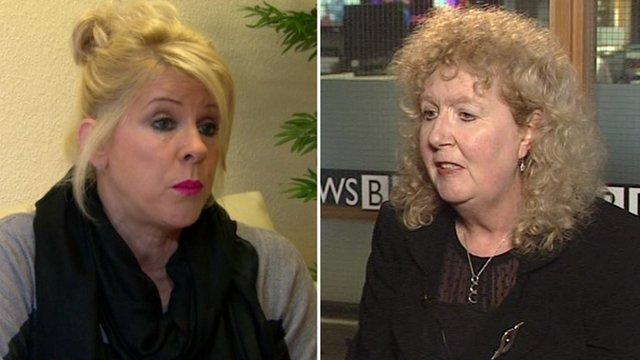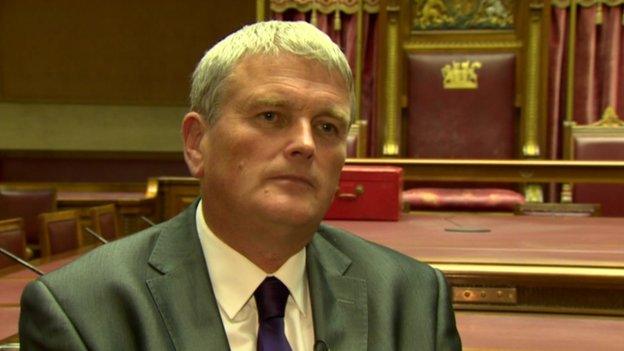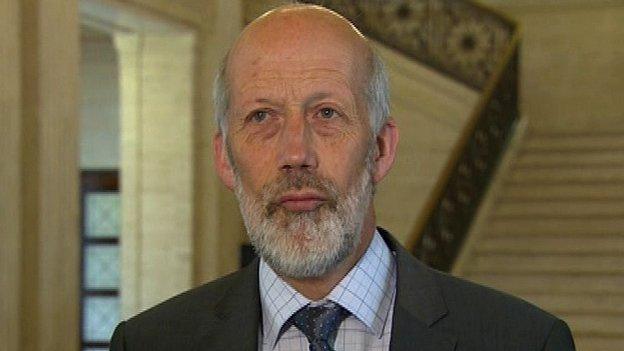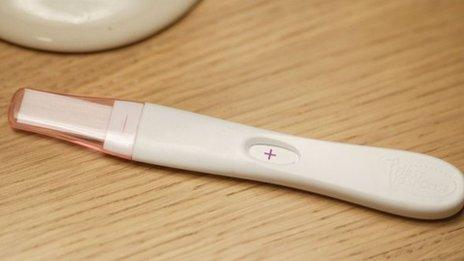Northern Ireland abortion law: public consultation on proposed changes
- Published
David Ford announced the consultation on Thursday
Abortions should be allowed in Northern Ireland where the foetus has a lethal abnormality, the Stormont Department of Justice has recommended.
The department is to begin a public consultation, external on amending the criminal law on abortion.
The public will be asked for opinions on possible changes to law in cases of lethal foetal abnormality and rape.
Currently, neither circumstance provides grounds for a legal abortion in Northern Ireland.
'Emotive area'
Lethal foetal abnormality is where a baby in the womb has a condition which means it will die while either in the womb or shortly after birth.
Justice Minister David Ford said he was making a "strong recommendation" for legislation to allow an abortion in circumstances where there is no prospect of the foetus being delivered and having a viable life.
Mr Ford has not made any recommendation on the issue of termination in the case of sexual crimes.
He added: "This is a very emotive area and I want to clearly state that this consultation paper in no way represents proposals for abortion on demand.
"It is not about the wider issues of abortion law, often labelled 'pro-life' and 'pro-choice'. It is about considering legislative changes in two specific sets of circumstances."
Guidelines
The consultation follows a decision taken by Northern Ireland's Department of Health last year, which said the issue of abortion for cases of lethal foetal abnormality could not be addressed by current abortion guidelines.
In 2013, the very public and personal story of Sarah Ewart raised the issue of what choices a woman has in Northern Ireland when told she carrying a child with a fatal foetal abnormality.
Sarah spoke to BBC Radio Ulster's Stephen Nolan about her abortion ordeal
Ms Ewart told BBC Radio Ulster's Nolan programme that her baby was diagnosed with anencephaly, a condition where the brain has not developed.
Under Northern Ireland's abortion guidelines, she was told she would have to carry the baby to full term.
Instead, Ms Ewart chose to travel to England for an abortion but her story triggered a massive public debate.
It also triggered the then Health Minister Edwin Poots to ask his officials to consider her case, to ensure "everything has been done that we would expect to be done, within the confines of the legal position that exists in Northern Ireland.
One year on, Northern Ireland's Department of Justice is consulting on two specific sets of circumstances.
The first is to enable a woman to choose to terminate a pregnancy when she is told the foetus has a lethal abnormality and cannot survive independently after birth.
The second is where the woman is made pregnant as a result of rape.
The first part of the public consultation paper addresses the question of lethal foetal abnormality and suggests the law should be changed so that women in that position would not have to travel to England to terminate such a pregnancy
While the consultation document outlines a number of options, the Department of Justice recommends that two clinicians would decide when a foetal condition is incompatible with life - that includes when no treatment after birth would improve chances of survival.
On the issue of sexual crime, the consultation paper questions what the law should be in the event of rape or incest producing a pregnancy.
When it comes to doctors, nurses and midwives, the consultation paper proposes that they have the right of conscientious objection when it comes to being involved in abortion.
Bernie Smith of Precious Life and Audrey Simpson of the Family Planning Association both welcomed the announcement
The public consultation runs for 14 weeks, closing on 17 January 2015.
- Published8 October 2014

- Published9 October 2013

- Published9 October 2013

- Published6 October 2014

- Published18 August 2014

- Published16 October 2013

- Published8 March 2013
